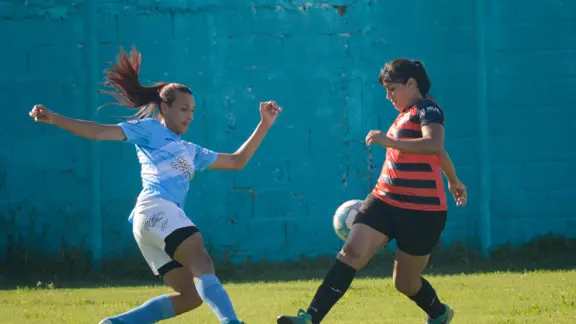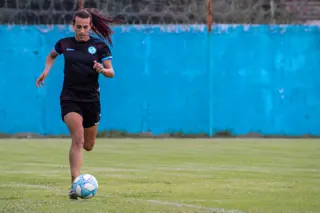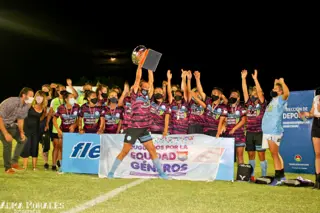Player Story
Mara Gomez: a pioneer trans footballer changing attitudes in Argentina

It is now seven months since she made her official debut in her team, Villa San Carlos, against Lanús, and she is still trying to reconcile her experience, what with the excitement of having broken a barrier of prejudice and discrimination, being a benchmark for future generations and having become a pioneer for the health treatments and policies required for her to participate.

In Pride Month, in an emotional interview, Gómez described her whole experience to FIFPRO, sharing her fears, joys and feelings as a trans footballer in the professional world.
Having presented as male at birth and raised as a boy in the La Granja neighbourhood of La Plata, she was 13, just entering her teens, when she decided to be Mara Gómez. “Once I made that decision, I went through two years of sheer hell, from being bullied at school to when I went to see the doctor and he called me by the name that appeared on my identity card”, she said.
“It was very difficult to imagine that I was going to have a future. All these situations made me feel I wasn’t cut out for this life. I had several suicide attempts as a teenager, and that was when football came on the scene”, she continued.
It was a sunny afternoon in La Granja when a neighbour, Adriana Aguirre, invited her to play a match in the “paddock” opposite Gómez’s house. And there a love was born, the symbol of a rescue.
“I was very bad at football; I’d never played before. But I realized it was doing me good, it was an emotional rescue. Today I can say that football was my refuge, a lifeline, an anaesthetic for all the pain I suffered in my daily life.”
In January 2020, after she had played for three amateur football clubs in La Plata and the city of Chascomús, the Villa San Carlos club decided to include her in its women’s team. In March 2020, the Argentine Football Association officially authorized her to play in the women’s competition, but because of the restrictions resulting from the coronavirus pandemic her debut was postponed until December that year.
In her new situation, having attained the dream she never dreamed of, Gómez, who is now 24, had to prepare to face new challenges and is still fighting inequalities, even in professional football.
There’s a myth that because I’m a trans player I have a physical advantage over women footballers
Despite the joy it gives her to be playing in the highest division of women’s football, Mara Gómez’s path is not easy, including having to undergo testosterone testing in order to fulfil competition participation requirements. This practice in itself can be both sensitive and intrusive, but having the procedure administered entirely by the Argentine players’ union, Futbolistas Argentinos Agremiados, which provides her with the health centre to have the analyses performed and accompanies her during the procedure, helps.
Even so, to be able to maintain the required testosterone levels Mara must undergo daily hormone treatment, which can directly affect her performance on the field.
“There’s a myth that because I’m a trans player I have a physical advantage over women footballers, but it’s just the opposite. I’m at a disadvantage. You have to understand that hormone treatment is invasive, because it changes the normal physiological conditions that the body itself produces. The disadvantages include loss of muscle mass and bone thickness, and it also has a big influence on your emotional and psychological state. That’s something I’ve been working on a lot”, she said.
“Besides, not much study has been done on hormone treatment in high-performance trans athletes. So I’m like a lab rat because there’s no background on this. And no one knows the various treatment techniques and the medium and long-term consequences for the body, she added.
Having no model to follow anywhere in the world made Mara Gómez a pioneer in the inclusion of trans people in professional football and gave her the responsibility of blazing a trail for future generations.

“I knew about Alba Palacios, a trans woman footballer in Spain, but she didn’t reach the major category in her club. I never found any role models, and that makes it difficult to travel this path, but at least it has enabled me to start breaking down people’s prejudices about trans people, as we’ve always been associated with prostitution and drugs.”
In Argentina, the quality of life for trans people is very tough. Life expectancy ranges from 35 to 41, and it is estimated that 90 per cent turn to prostitution to survive. “Today I’m not afraid to go out on the street. I know anything can happen to me, like other trans girls. Now I prefer to think about the fact that I have a respectable image and that through my story I’ve helped a lot of people to change their perspective on being trans. There are many people who told me I was a ‘guy’ and couldn’t play with women and have now apologized and accept me the way I am."
Gómez also acknowledges that the restraint and understanding of her family when she made her decision as a teenager played a decisive part in enabling her to find her way in life. “If my family hadn’t supported me from day one, my situation would have been different. I would have fallen into prostitution or committed suicide, because I was suffering so much.”
Today, as she is about to finish a university degree course in nursing and is more and more firmly established in her role as a forward for Villa San Carlos, Gómez hopes her example may help thousands of young trans people to pursue their dreams in sport. “I hope to give them the prospect of not having to suffer in the future to be able to find a place in football. To me, football is not just a competitive sport. It’s a lifeline, a world that offers restraint, socialization and help. Football must be a right for everyone, both men and women.”
